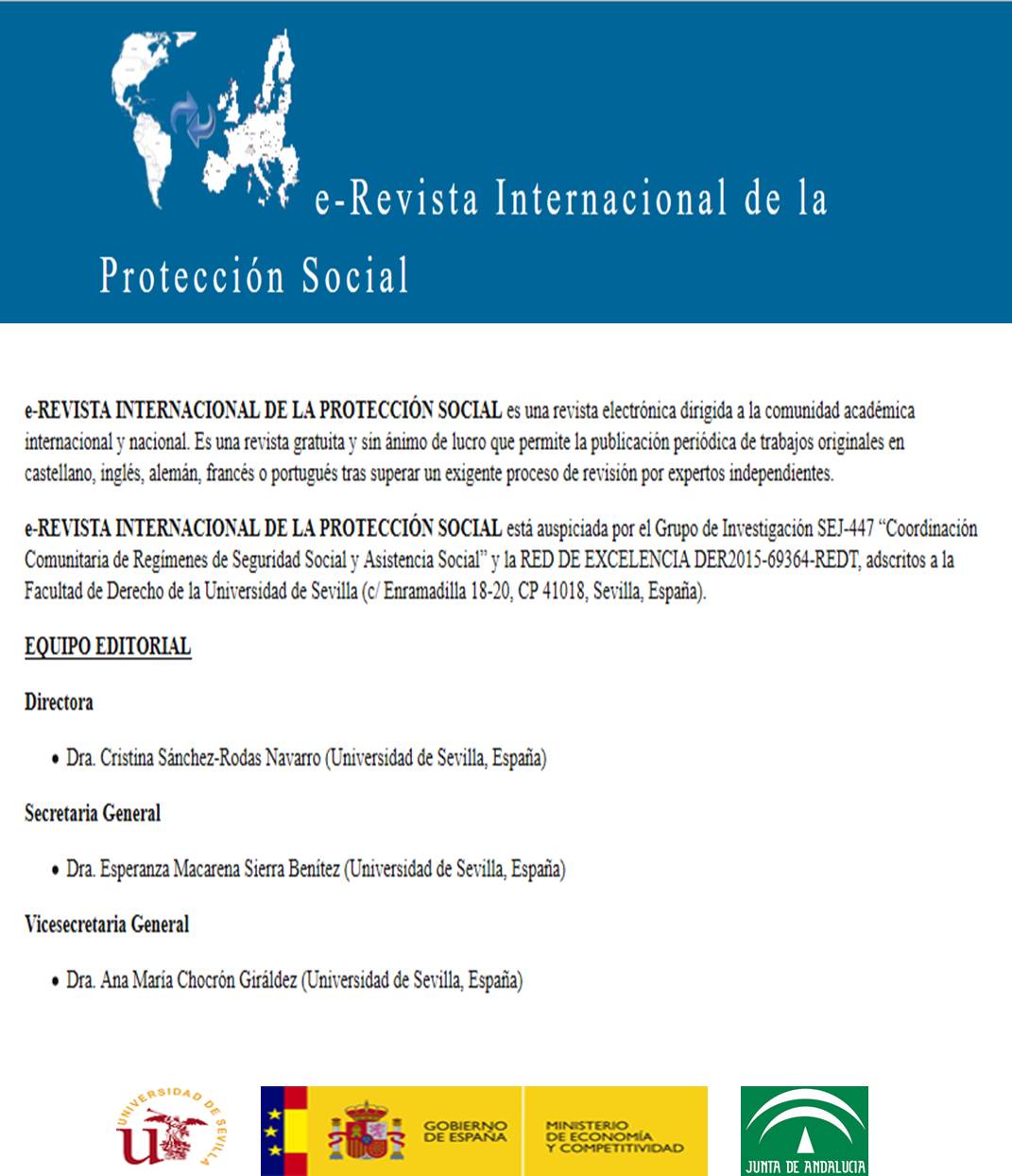SOCIAL DIALOGUE AND VULNERABLE GROUPS: YOUNG PEOPLE, OLD WORKERS: THE PORTUGUESE PERSPECTIVE
DOI:
https://doi.org/10.12795/e-RIPS.2016.i01.10Resumen
The financial crisis that hit the global market in the middle of 2008 gave way to the sharpest contraction of the European economies since the Great Depression, a crisis that has resulted in widespread job losses and social hardship. Unemployment, especially youth and long term unemployment, is destructively high, and a growing numbers of workers are found among the working poor, and an evolving awareness of inequality has galvanised policy debates across the globe and Portugal is no exception to this situation. A growing cohort of workers, especially among the young and old, is shouldering the flexibility that employers demand, leading to growing job insecurity and a greater inability of workers to manage their working hours and ensure a decent income.
In this paper we highlight that policies promoting employment and equality and nondiscrimination must focus on the groups of employees with the most severe problems in the labour market. One of these groups, among others, are young people and older ones, since the risks of long-term social exclusion has strongly increased in Europe for them.
Secure jobs, which were once the norm for previous generations in Portugal, have become less easily accessible for today’s youth. At the same time, informal employment among young people remains pervasive and transitions to decent work are slow and difficult.
With this paper we try to dedicate special attention to this disadvantage group, because we think that it is both a social emergency and an economic necessity.
It is also of core importance to develop Active Labour Market Policy who has the aim to transfer the use of passive support to active help for integration of people in the labour market, like the Youth Guarantee programme that Portugal established.
The role of the social partners and social dialogue is also critical in this context, as they have a significant part to play in shaping and improving working conditions.
Descargas
Descargas
Publicado
Cómo citar
Número
Sección
Licencia
e-Revista Internacional de la Protección Social es una revista de acceso abierto, lo que significa que todo su contenido está disponible gratuitamente para el usuario o su institución. Los usuarios pueden leer, descargar, copiar, distribuir, imprimir, buscar o enlazar con el texto completo de los artículos, o utilizarlos para cualquier otro fin lícito, sin solicitar permiso previo al editor o al autor. Esta definición de acceso abierto se ajusta a la Iniciativa de Acceso Abierto de Budapest (BOAI).
 4.0
4.0
A menos que se indique lo contrario, todo el contenido de la edición electrónica se distribuye bajo una " licencia internacional Creative Commons Atribución-Nocomercial-Compartirigual 4.0 Internacional". Puede consultar la versión informativa y el texto legal de la licencia aquí. Esto debe indicarse expresamente de esta manera cuando sea necesario.
En caso de aceptación del manuscrito, los autores ceden los derechos de la obra para su publicación a eRIPS. Revista Internacional de la Protección Social bajo el contrato de licencia Reconocimiento-NoComercial-CompartirIgual 4.0 Internacional (CC BY-NC-SA 4.0). Los autores conservan los derechos de autor y terceros están autorizados a compartir y adaptar la obra, siempre que cumplan con los términos y condiciones establecidos en la licencia.
- Usted debe dar crédito de manera adecuada , brindar un enlace a la licencia, e indicar si se han realizado cambios . Puede hacerlo en cualquier forma razonable, pero no de forma tal que sugiera que usted o su uso tienen el apoyo de la licenciante.
- Usted no puede hacer uso del material con propósitos comerciales .
- Si remezcla, transforma o crea a partir del material, debe publicar sus contribuciones bajo la misma licencia que el original.
Se puede encontrar más información en https://creativecommons.org/licenses/by-nc-sa/4.0/deed.es
Se permite y recomienda a los autores/as difundir su obra a través de Internet (p. ej.: en archivos telemáticos institucionales o en su página web) antes y durante el proceso de envío, lo cual puede producir intercambios interesantes y aumentar las citas de la obra publicada.











